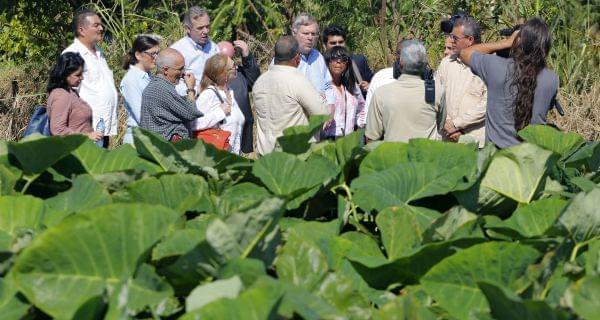Industry, Agriculture Leaders Support Lifting Trade Embargo With Cuba

U.S. Secretary of Agriculture Thomas Vilsack, center right, and Senator Jeff Merkley of Oregon, left of Vilsack, visit the Guira De Melenas cooperative organic farm in Guira De Melenas near Havana, Cuba, Friday, Nov. 13, 2015. Desmond Boylan/Associated Press
Farmers and industrial leaders say they're ready to see the U.S. end its trade embargo with Cuba that's been in place since the early 1960s. One official with Caterpillar says the heavy equipment maker has done what it can to prepare for such a move, while a member of the Illinois Corn Growers Association Board has done limited trade already as a kind of "humanitarian" effort.
Marcos Sallowicz is Peoria-based Caterpillar's Regional Director for Latin America.
Appearing on WILL’s The 21st Monday, he says Caterpillar has been lobbying Congress for decades to end the embargo. Last month, the company announced Caterpillar products will be sold through a dealer in Cuba.
Sallowicz says it’s heartbreaking for him to see a number of European brands there, but not from the U.S.
“We are working on all the internal processes for Caterpillar that will enable us to sell immediately once the embargo is lifted," he said. "As well as all the work that’s being done by our public affairs team with the congressmen and congresswoman on trying to address our concerns and work with the people in Cuba.”
While Caterpillar is now barred from dealing with Cuba because of the embargo, current law allows U.S. companies to export limited amounts of agricultural and medical products for humanitarian reasons.
Sallowicz says the company has also been involved in charitable efforts in the country.
The corn growers board's Ted Mottaz, who visited Cuba last year, says there's no reason the embargo can't be lifted. On Monday's program, he discussed challenges faced by Cuba’s food industry based on what little they have to work with.
The US trade embargo with Cuba took effect about 55 years ago, after Fidel Castro came to power.
Mottaz says if and when it’s lifted by Congress, he says Cubans will need to be taught how to use modern agricultural equipment.
“I remember 1959, 1960, when this all started," he said. "And they are frozen in that time. I look upon our involvement with Cuba, especially in the food end of it, is almost a humanitarian effort. Not only do we look at everything that’s been said about trade, that’s extremely important us, we need all the outlets we can get. But these people need everything.”
Mottaz, who runs a family farm in Elmwood, near Peoria says it’s time to "let bygones be bygones" with a country 90 miles outside the U.S. that really needs the product.
Links
- US Reps. Davis & Bustos Voice Hopes For More Illinois-Cuba Trade
- Mi Moto Fidel: Motorcycling Through Castro’s Cuba
- Trade Mission: Cuba
- Durbin Addresses State Budget Stalemate, Embassy In Cuba
- Davis Says Trade With Cuba Could Help Overthrow Castro Regime
- George Ryan: Cuba Relations Will Open Markets
- US Shift On Cuba Opens Doors For Illinois Farmers
